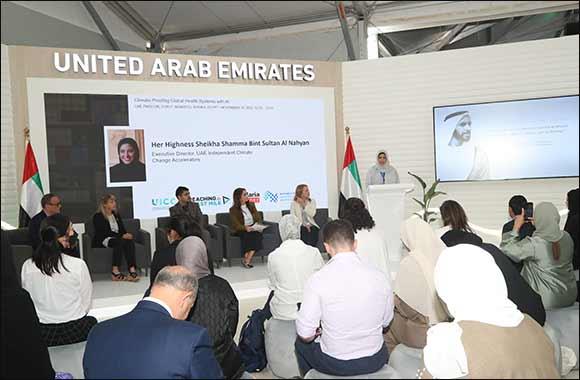(MENAFN- Dubai PR Network) Malaria No More, and Reaching the Last Mile Host Climate & Health Panel on the Sidelines of the United Nations Climate Change Conference (COP27)

Abu Dhabi, November 11, 2022 – Malaria No More, in partnership with the Reaching the Last Mile Initiative, today hosted a panel discussion through its climate and global health initiative, Forecasting Healthy Futures. The session was entitled“Climate-Proofing Global Health Systems with Earth Observation Data, Artificial Intelligence, and other transformative technologies.”
The discussion centered on emerging global health solutions, fuelled by catalytic investments by the Reaching the Last Mile initiative. Panelists discussed the challenges climate change poses for disease elimination efforts and presented a selection of highly sophisticated prediction and planning tools using multiple data sources, high-resolution earth observation data, and artificial intelligence to predict and prevent disease outbreaks.
Her Highness Sheikha Shamma bint Sultan bin Khalifa Al Nahyan, the Executive Director of UAE Independent Climate Change Accelerators (UICCA) and renowned philanthropist, delivered the keynote address, which was held at the UAE Pavilion at 2022 United Nations Climate Change Conference (COP27) in Sharm El-Sheikh, Egypt.
This was followed by a panel moderated by Kelly Willis, Managing Director at Malaria No More, with participation from the following speakers:
• Tala Al-Ramahi - Director, Reaching the Last Mile
• Dr. Hosni Ghedira - Director of Engagement Services, Mohamed bin Zayed University of Artificial Intelligence
• Tatiana Loboda - Professor and Chair, Department of Geographical Sciences, University of Maryland
• Dr. Kaushik Sarkar – Director, Institute for Malaria and Climate Solutions, Malaria No More
The panel was held on the sidelines of the 2022 United Nations Climate Change Conference (COP27) during a session on climate change and global health. Malaria, one of the world's oldest and deadliest diseases, devastates families and perpetuates the cycle of poverty in many communities and countries. Climate change threatens to slow progress toward eliminating malaria and many other climate-sensitive infectious diseases as climate events, such as rising temperatures, changing rainfall patterns and extreme weather, disrupt health systems and impact the range and seasonality of vector borne diseases.
Sheikha Shamma bint Sultan bin Khalifa Al Nahyan, Executive Director of UICCA, commented: 'Technology is an invaluable resource which we must optimise in order to identify innovative means to tackle the climate crisis. To achieve this, it is essential that private and public sectors work together to bring forward technological advancements, enabling us to harness the power of innovation to transform global health outcomes and secure the future of our planet and its people.'
Sheikha Shamma added:“While here at COP27, the most important climate change action conference in the world, I implore my peers in the sustainability community to encourage international leaders to place global health and climate action at the top of their agendas.”
Tala Al-Ramahi, Director at Reaching the Last Mile, added:“As the world gathers in Egypt to focus on mitigating climate change, it's more important than ever that we exert maximum efforts to build an understanding of how this change affects some of the world's most vulnerable populations, and how preventable diseases are continuing to trap families in cycles of poverty. Alongside our valued partners, we are committed to exploring innovative solutions and new technologies to assist us in the fight against such diseases, and help shape our future disease eradication policies, and strategic approach.”
Kelly Wills, Managing Director at Malaria No More, said:“COP27's emphasis is on the active implementation of climate commitments, and that's exactly what we're doing. Forecasting Healthy Futures means engineering smart solutions to the challenges imposed on the world's most vulnerable, by rising temperatures and changing weather patterns. The United Arab Emirates and Reaching the Last Mile are leading the charge, and all FHF consortium members are determined to end malaria and other global health challenges in the context of climate change.”
Ahead of today's panel discussion, Forecasting Healthy Futures announced plans to hold its inaugural Summit on February 27-28, 2023, in Abu Dhabi. The Summit will be the first of its kind, bringing together global policymakers alongside technical leaders spearheading emerging solutions for climate-sensitive infectious disease for workshops and a 2-day plenary conference.
Since its launch in 2020, Forecasting Healthy Futures has worked to“climate proof” infectious disease elimination efforts by developing increasingly sophisticated prediction and planning tools and designing supportive policies to help governments implement them, to better time and target effective health interventions amid the many changes brought about by global warming. In January 2022, Forecasting Healthy Futures launched the new Institute for Malaria and Climate Solutions (IMACS), a global institute with the mission to combat malaria in the face of climate change and weather volatility.



















Comments
No comment